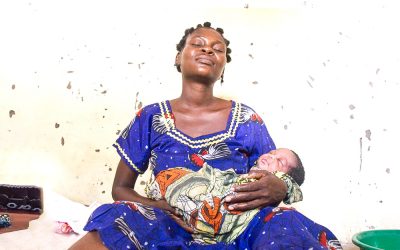leadership & Governance
Improving the availability and use of quality primary healthcare services.Leadership & Governance in the DRC
DRC’s National Health Strategy 2016-2020 calls for strengthened leadership and governance within the health sector.
The MOH specifically faces challenges at the provincial and health zone level in its ability to coordinate stakeholders and interventions, implement decentralization and healthcare reforms, and ensure care adheres to national standards. Weak leadership and functional steering bodies at the provincial and health zone level also results in a lack of evidence-based decision making and appropriate allocations of resources. Health Zone Management Teams and Health Development Committees (CODESAs), though present in almost all health zones, are much more responsive to routine administrative needs than to issues of management and good governance.
894 CODESA are now operational in ASSP’s assisted health zones.
How ASSP is Improving leadership & governance
ASSP improves leadership and governance by supporting the governance system at all levels. This includes support to administrative council meetings, planning meetings and documents and supervision. Using a leadership and governance lens, ASSP hopes to increase the understanding of social accountability both within and outside of government throughout all aspects of the project. Both the community and health service providers have roles to play. The project’s two supportive objectives under Leadership and Governance are therefore to:
- Strengthen accountability at the provincial and health facility level for health service delivery.
- Improve community participation and empowerment in the joint management of local health center activities.
Key Achievements
Community Score Cards
892 health areas completed the Community Score Card process, developing plans to improve a variety of factors that impact health uptake, including the poor availability of quality drugs and supplies, poor cleanliness, poor infrastructure, poor customer service, and high fees in relation to service quality.
Community Engagement
More than 8,000 copies of the Community Committee Handbook has been distributed throughout the DRC, not just in the ASSP health zones.
CODESA
During Year 5, the number of operational CODESA (health development committees) has reached 894. This represents 113% of the annual target of 790 and 108% of the number of health facilities originally targeted. The frequency of meetings has also increased, resulting in greater dialogue on improving health service delivery and collaboration between the community and health facility management.
Community Hotline
Since the launch of ASSP’s business abuse hotline in February of 2016, the Ministry of Health has resolved 1187 issues reported by health centers and community.
read more about our work in leadership & governance
Publications

Leadership & Governance
IMPACT: Community Empowerment during ASSR - June 2022 (pdf)
ASSR Success Story: Community Empowerment - June 2022 (pdf)
ASSR Strategic Partnerships - June 2022 (pdf)
ASSP Leadership & Governance Brochure – September 2019 (English version) (version française)
A Hotline In DR Congo Connects People With The Ministry Of Health
In the Democratic Republic of Congo, IMA World Health works with the Ministry of Health to create...
IMA Appears Before British House Of Commons International Development Committee
MA World Health appeared before the British House of Commons International Development Committee...
ASSP Empowers Health Zones In DR Congo
Perched on the southern banks of the Ubangi and Uele rivers at the border of the Central African...
QUICK CONTACTS
Recent Posts
Quarter 1 Results
Number of pregnant women who received three doses of IPT while attending antenatal care: 58,495Number and percentage of 1-yr-old children vaccinated against measles: 78,123Number of Couple Years of Protection (CYPs) achieved through family planning service provision:...
Saved by my Son: A Tushinde Ujeuri Success Story
"The support from the Tushinde program has restored my will to live." Tushinde Ujeuri Project brings hope to one survivor of sexual and gender-based violence in DRC It was mid afternoon, and my 10 year-old son and I were walking home from working in the fields. When...
Combatting Malnutrition in DRC: A Nutrition Success Story
Community relays in Ndesha, Kasai Central are successfully combatting malnutrition in the DRC thanks to ASSP's nutrition training. Combatting Malnutrition One Maman at a TimeMado Betu was a young child of two years and four months but was frail and unable to walk when...





